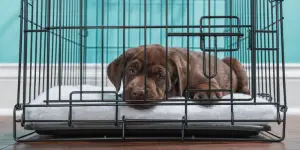
How to stop your puppy from crying in its crate at night
- Written by Joshua Gordon
- Last updated
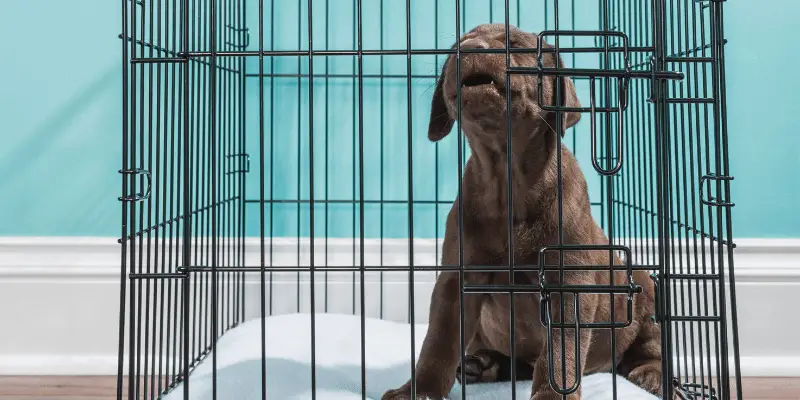
How to stop your puppy from crying in its crate at night – Key takeaways
- Keep a routine. Puppies thrive on routine which will help them understand when it’s time to settle down to sleep.
- Crate location is key. Start by placing the crate in or near your bedroom then gradually move it out to your preferred location.
- Don’t rush the crate training process. Like learning anything, build up your puppy’s confidence over time.
- Comfort, not attention, and reward silence. Make sure your puppy is comfortable but do not give attention. Reward silence, positive reinforcement is the best teacher.
- Don’t leave your puppy to cry for longer than 15 minutes if you haven’t checked their fundamental needs. Start small and build up time in the crate.
- Puppy’s cry in their crate for days up to weeks so be patient and persist. Bedtime crate training can be a long process, do not give up after a few days.
In this article
Tips to help your puppy from crying in its crate
Listening to a puppy cry can be both upsetting and frustrating for an owner.
A puppy who has never been crate trained or spent time alone is likely to cry when they’re in a new situation as it’s scary and overwhelming.
If your puppy is constantly crying in their crate, here are some tips on how to get them to stop.
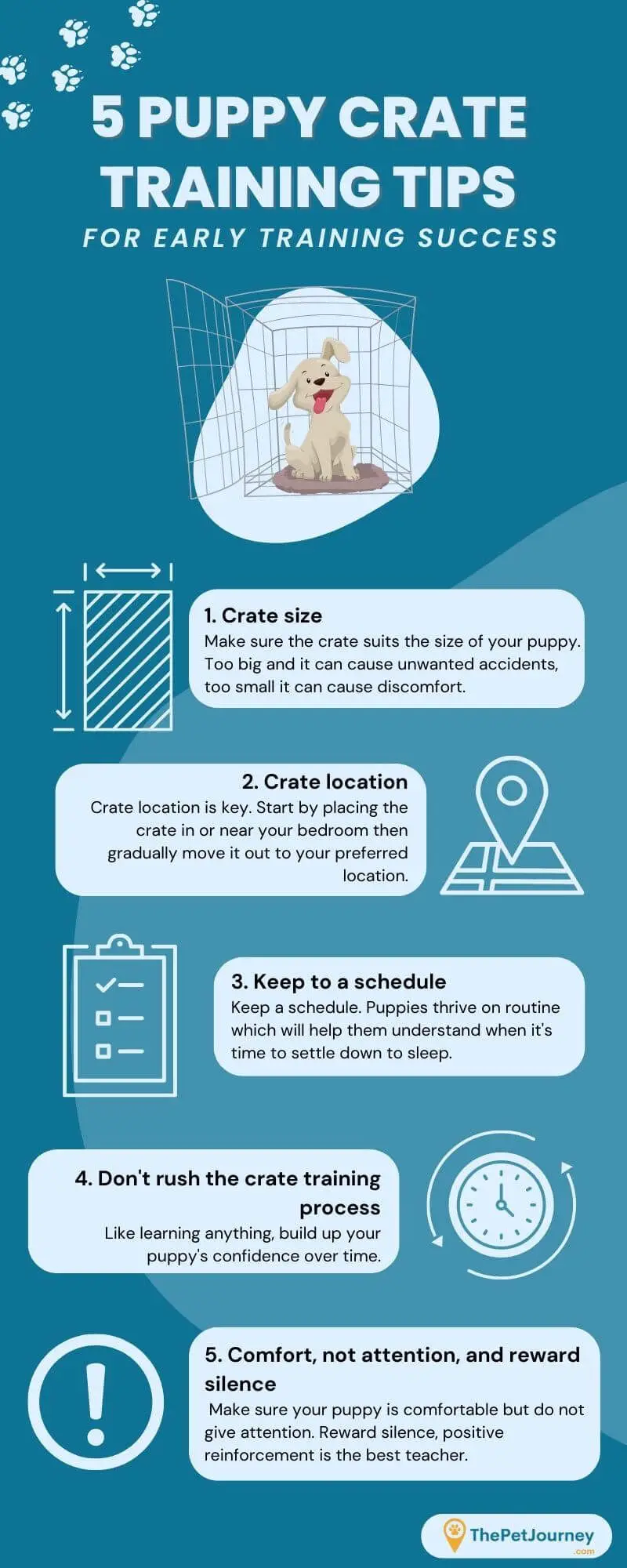
Keep a routine
Establishing a daytime and bedtime schedule is important for puppies as dogs thrive on routine. It helps them know what to expect each day, such as meals, walks, play sessions and bedtime.
For instance, your puppy’s evening schedule could be an hour of quiet time on the sofa, then a quick bathroom break before bedtime.
This will help your puppy understand when it’s time to sleep, making them less likely to cry while inside their crate.
Where to put the crate
For the first couple of weeks, until your puppy has had time to get used to their new home, you should put your puppy’s crate in your bedroom or just outside the door. That way, your presence will also help comfort and soothe your puppy and you’ll be able to hear if your puppy cries because they need the toilet.
Once your puppy is a bit older, you can gradually move their crate into a different room. During the day, move the crate to your living room and keep training your puppy to associate their crate with something positive.
Wear your puppy out every day
Puppies have a lot of energy and love nothing more than to play and explore, but if your pup isn’t given enough time to let off steam each day, it can cause behavioral issues they’ll be less likely to sleep during the night due to pent up energy.
You can help tire your puppy by playing with them frequently during the day and, if they’ve completed their vaccinations, take them for a walk.
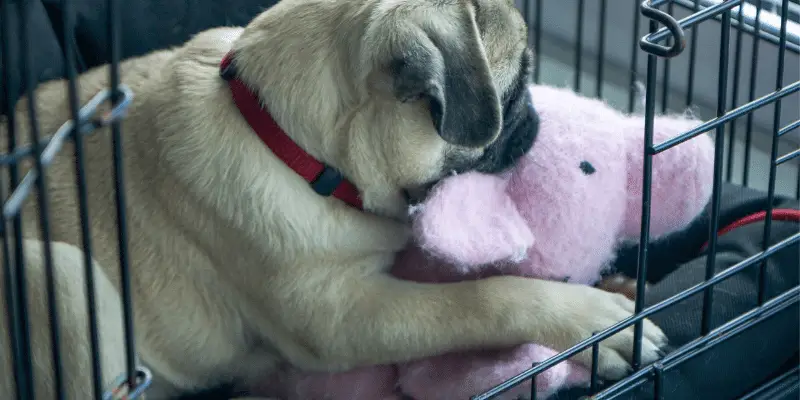
Provide comfort but not attention
Although you shouldn’t give attention to a crying puppy at night, you should still check on them as they could be in pain or in need of a potty break. Once you know your puppy’s care needs have been attended to, don’t be tempted to return as they’re only crying because they want attention.
Don’t rush crate training
Crate training a puppy can be a lengthy process and isn’t something that should be rushed. In fact, doing so can cause more harm than good. You need to teach your puppy that their crate is somewhere safe and positive, not something to fear or stress over.
Gradually build up your puppy’s confidence around the crate by offering treats and praise if they sniff, investigate, or step inside it. Make sure you keep the crate door open so they can enter or exit it on their own terms.
Once your pup is beginning to get used to the crate, you can start to close the door for a couple of minutes while you’re in the room, gradually increasing the duration until your puppy is happy being inside the crate alone.

The Vet's top tip - How can stop my puppy from crying in their crate?
"If your puppy is crying in its crate, let them out right away. Crying is your pup’s way of knowing they are distressed. They may feel worried about being in the crate, or perhaps they are bored, craving interaction or thirsty. A puppy should be calm and content when in their crate.
Make sure you properly crate train before starting to use the crate regularly"
- Dr Linda Simon MVB MRCVS
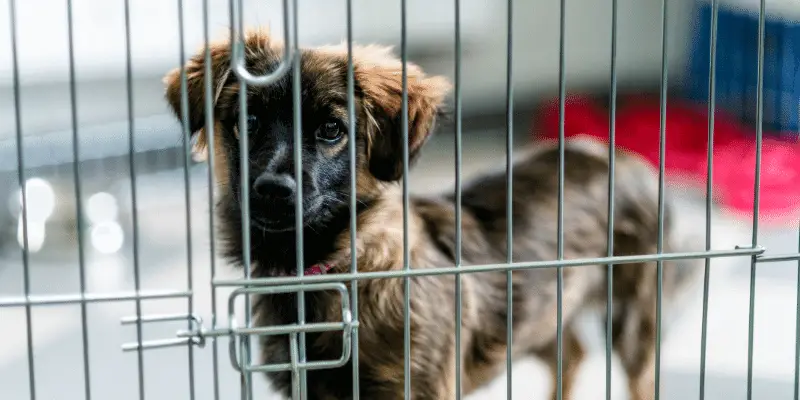
Limit access to distractions
During the evening and when your puppy is inside their crate at night, you should keep distractions to a minimum so your pooch doesn’t get riled up. Close windows/curtains and dim the lights.
Don’t make any loud noises and put the TV at the lowest volume. If there’s a lot of activity going on in your house, your puppy will want to join in on the action and sleep will be the last thing on their mind!
Reward your puppy’s silence
During your puppy’s crate training, you should reward quiet and calm behaviour to encourage your pup to be silent when they are inside the crate. Dogs learn best through positive reinforcement, so by praising or feeding your pooch a treat when they are quiet, they are more likely to repeat the behaviour.
When do puppies stop crying at night?
Puppies stop crying at night once they have had time to get used to their new environment and their crate. This can take a few days, several weeks, or sometimes longer depending on the puppy.
Some pups may only cry for the first night or two, while others may cry for a few weeks. It’s important not to scold your puppy if they are crying as this will only increase their anxiety and stress levels.
Your puppy should view their crate as a comfortable, safe, and secure area. Never use a crate as a form of punishment, otherwise, your pup will see it as a negative and somewhere they go when they’re in trouble.
How long should I let a puppy cry in its crate?
If your new puppy starts crying in their crate, you should wait 10-15 minutes to see if they settle down. If the crying and whining persist, make sure their basic needs have been met.
Try to avoid leaving your puppy in their crate for more than 2 or 3 hours at a time if they are under 12 weeks old. A good rule of thumb is to take your puppy’s age in months and use it as a guideline for estimating the number of hours they can stay in their crate.
For instance, a 5-month old pup can be left in their crate for 4 to 5 hours if you need to run errands or leave the house.
However, no dog should be confined to a crate for more than 8 hours.
New puppies will not be used to being alone or confined to a crate, so leaving them to cry, especially at night, can be counterproductive by increasing their fear and anxiety. Once your pup has had a few weeks to settle in, it’s simply a case of persistence and patience.
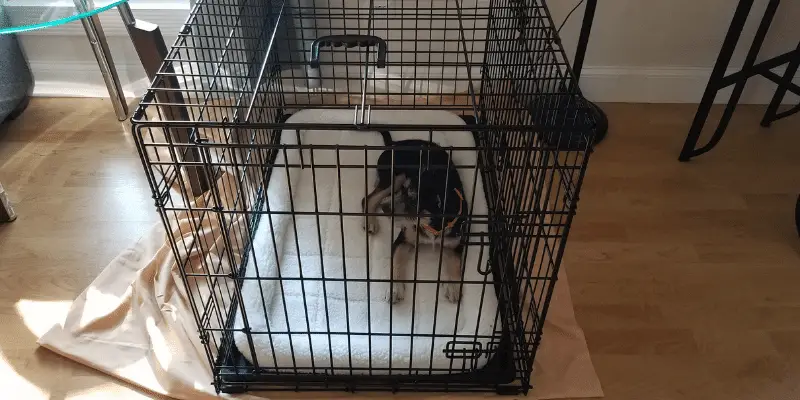
Should I leave my puppy to cry at night?
You should avoid letting your new puppy cry at night, especially if they have not been with you for very long. It’s best to build your puppy’s alone time gradually so they feel overly stressed or anxious at bedtime.
For the first few nights or weeks, place your puppy’s bed or crate in your bedroom or just outside the door. Once your puppy has had time to get used to their new family, you can begin to move their crate to another room.
Puppy crying on the first night
The first few nights are always the most challenging for a new puppy as moving home is a huge change. Being in a different environment with unfamiliar people can be overwhelming, especially once it’s dark and all the lights are off.
While it’s important not to offer your puppy any attention while they are crying in their crate at night, you shouldn’t ignore them completely. Take them straight outside to use the bathroom on a leash, then immediately put them back into their crate.
It’s fine to offer a bit of reassurance to your pup to help settle them back into their crate, but be careful not to overdo it as they may start crying again to try and get you to come back.
Additionally, if you give your puppy attention every time they whine in their crate, it will teach them that crying gets them what they want (i.e, you!).
Why do puppies cry in their crates?
Puppies tend to cry in their crates because they are not used to being alone, away from their mother or confined to a small space. Dogs, especially when they are young, are social animals and enjoy the company of others in their ‘pack’.
It’s normal for puppies to whine when they feel alone. Puppies cry as a way to communicate that they need or want something, whether that’s attention, food, water, warmth, or the toilet. While most puppies cry in their crates due to fear of abandonment, some may be bored or frustrated.
It’s important to note that if your puppy’s mother or father was anxious and fearful, their personality is also more likely to be on the nervous, timid side. A recent study on Great Danes concluded that fearfulness and anxiety are hereditary traits in dogs.
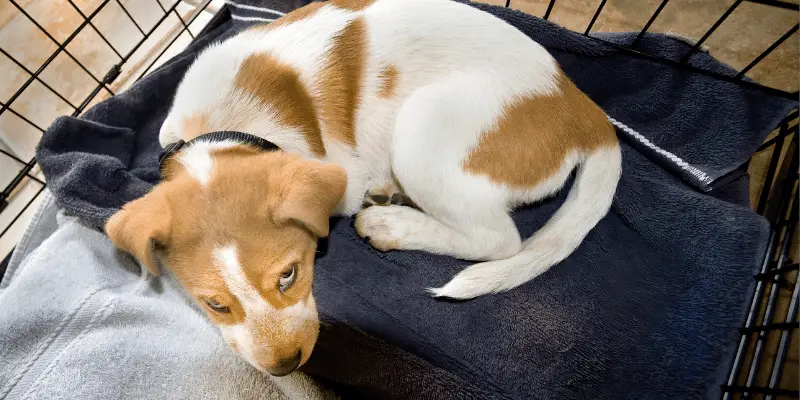
The importance of a puppy crate training
Using a crate is beneficial for a puppy as it teaches them independence, helps strengthen their bladder and bowel muscles, and provides them with a safe secure space that they can retreat to when they feel threatened or scared.
Dog car crates make travelling with your dog much easier and safer. Your dog can take a nap or play with a chew toy while you can focus on getting to your destination. There’s also no risk of your dog jumping into the front seats of the car and distracting the driver.
Alternatively, if you’re on the train, putting your dog in a crate keeps them secure so they don’t bother other passengers.
References
- https://www.petful.com/behaviors/puppy-keeps-crying-at-night/
- https://moderndogmagazine.com/articles/what-do-when-your-puppy-cries-night-his-crate/129031
- https://www.goodboy.co.uk/advice-hub/7-tips-to-stop-your-puppy-crying-at-night/
- https://www.pdsa.org.uk/what-we-do/blog/vet-qa-why-do-puppies-cry-at-night
- https://www.akc.org/expert-advice/training/why-crate-training-is-great-for-your-dog/
- https://ourfamilydog.org.uk/puppy-crying-at-night
- https://www.dogstrust.org.uk/help-advice/training/positive-reinforcement-training-with-rewards
- https://www.akc.org/expert-advice/advice/canine-communication-deciphering-different-dog-sounds/#:~:text=Whining%20or%20crying%20is%20another,you%20know%20they’re%20unhappy.
- https://www.sciencedaily.com/releases/2020/05/200529150627.htm

Written by: Joshua Gordon
Head of Research and Editorial, Joshua has over 7 years of experience as a finance and automotive research consultant. He is a childhood pet owner and dog enthusiast.

